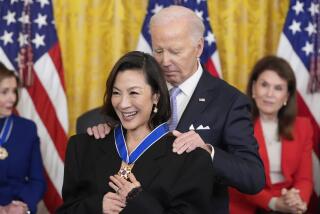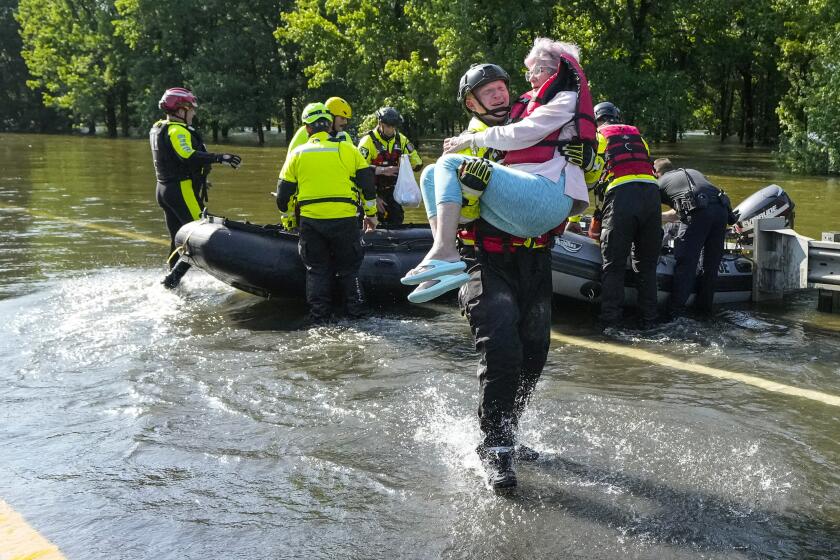Shiite gunmen slay 70 Sunnis in Iraq
The Iraqi army scrambled Wednesday to stop sectarian violence in the northern city of Tall Afar, where Shiite Muslim policemen, aided by an angry mob, killed at least 70 Sunnis in revenge for a pair of truck bombings a day earlier.
The police went on the rampage in Tall Afar’s Sunni neighborhood of Wihda after two truck bombs exploded Tuesday, killing 85 people, most of them Shiite Turkmens. The group Al Qaeda in Iraq claimed responsibility for the bombings, which left 183 wounded.
The violence in Tall Afar, a predominantly ethnic Turkmen city once touted by the Bush administration as an example of successful pacification, came amid an apparent strategy by militants to strike areas outside Baghdad. U.S. forces have shifted to the capital as part of a new security crackdown there.
‘Anger and passion’
It was the deadliest episode of sectarian revenge killings in Iraq since October, when a rampage over several days in Balad left more than 100 Shiite and Sunni Arabs dead.
Iraqi officials said the Tall Afar attackers were policemen in civilian clothes, but they suggested that other elements might have been involved. “Mostly it was [off-duty] policemen. The Ministry of Interior is making an investigation,” said Lt. Gen. Nassar Abadi, the deputy chief of staff of Iraq’s armed forces.
Witnesses said the gunmen seized men from Sunni houses and shot them to death.
“Ten gunmen wearing civilian clothes stormed our house. I hadn’t seen their faces before. They took my brother into a separate room upstairs and put me with the women,” said a wounded man in the Tall Afar hospital.
“I heard the gunshots and I found my brother dead, two bullets in the head. I was rushing to see my brother when they opened fire on me. I got two bullets in my leg. They ran away after that.”
The victims included women and children, said Nineveh province Gov. Duraid Kashmoula.
“Some of these irresponsible policemen and angry people did this stemming from their anger and passion, but mostly it was policemen who committed this unacceptable and irresponsible act. We totally disagree with such attacks,” the governor said.
“One of those angry policemen lost five of his family members in this explosion and he lost his mind. They were irresponsible reactions and we are going to follow this up.”
The governor said the killing spree lasted about 30 minutes as policemen fired on families in their homes. He blamed the truck bomb plotters for provoking the shootings.
“The real aim of the terrorists was to create fitna [discord] between Sunni and Shia,” he said.
Dr. Khalil Rasheed at the Tall Afar hospital said a woman with a cut on her hand told him that 10 gunmen, some of them masked and in civilian clothes, burst into her house after her son opened the door.
“They immediately opened fire at my husband and ran away. They killed him in front of me and my children,” Rasheed said the woman told him.
The dead ranged in age from 20 to 50 and were shot execution-style, said a doctor who spoke on condition of anonymity.
“They are now cast on the ground because there is not enough room for them in the hospital,” the doctor said.
“I haven’t seen something like this in my life before. Even when the Americans conducted raids in Tall Afar, it wasn’t as horrible as this.”
Iraqi Prime Minister Nouri Maliki formed a committee of officials from the defense and interior ministries to investigate, the U.S. military said.
A divided city
U.S. and Iraqi forces recaptured Tall Afar from insurgents in September 2005. Six months later, President Bush heralded it as a success story, but the city, 240 miles northwest of Baghdad near the Syrian border, provides an attractive way station for fighters slipping into Iraq, and it has fallen back into violence.
The mainly Turkmen city mirrors Iraq’s sectarian divisions. It is a volatile mix of Shiite and Sunni Turkmens, as well as ethnic Kurds, who are mostly Sunni.
Members of the Iraqi army’s Kurdish 3rd Division imposed a curfew on Tall Afar, placing themselves between the Sunni and Shiite sections of town in order to stop the violence.
“Our commander gathered tribal leaders and said this is not the way forward. You are losing. You should be mature rather than take these kind of actions,” said Abadi, the army deputy chief of staff.
The violence comes at a time when Iraq’s Sunni Arab insurgency is fraught with tensions. On Tuesday, Al Qaeda in Iraq assassinated the head of the insurgent group 1920 Revolution Brigade, his bodyguard and a relative in the Baghdad suburb of Abu Ghraib.
Sunni Arab tribesmen have declared war on Al Qaeda in Iraq in the city of Ramadi, in Al Anbar province. Iraqi government and U.S. officials have said they are in talks with Sunni insurgent groups to form a coalition against the terrorist group.
Al Qaeda in Iraq is struggling to mend its rifts with rival factions and unite them in its fight against the Shiite majority and U.S.-led foreign forces, making it more vital for the group to foment sectarian violence, observers say.
Sunni Turkmen politician Ali Talfari, with the Turkmen Front, blamed Shiite cleric Muqtada Sadr’s Al Mahdi militia for the killings, but Nineveh’s governor and Iraqi military officials said the militia had no presence in Tall Afar. Nassar Rubaie, a member of parliament who is close to Sadr, also denied that the militia was involved in the attack.
Gov. Kashmoula said the truck bombings killed Shiite as well as Sunni Turkmens. Television images from the blast site showed residents retrieving the charred bodies of relatives, still coated in the flour in which one of the bombs had been hidden.
Suicide attacks in Fallouja
Meanwhile, in the mostly Sunni province of Al Anbar, suicide bombers with chlorine-laden trucks attacked the government center in Fallouja, the U.S. military said.
The attack began with mortar shelling at 6:30 a.m., followed by a truck bomb, which exploded when Iraqi police fired on it, and then a second truck bomb, which blew up near the entrance to the compound, the military said. Fifteen U.S. and Iraqi forces were wounded, and Iraqi police and army soldiers were treated for exposure to the chlorine gas, which can be deadly in concentrated doses. It was the eighth reported attack using chlorine since January.
Jamal Farhan, 42, a lawyer in Fallouja, said the latest attacks were a result of Al Qaeda in Iraq’s fight with the Anbar Salvation Council, a collection of tribesmen in Ramadi.
“The main reason behind this wave of violence is due to what the tribes of the Anbar Salvation Council are doing. In chasing the terrorists, they forced Al Qaeda to escalate their operations in Fallouja,” he said.
Elsewhere, a bomb killed a policeman just outside the northern oil city of Kirkuk and wounded two others, police said. Another officer was wounded in a drive-by shooting, police said.
In Baghdad, 13 unidentified bodies were recovered Wednesday, police said.
A suicide bomber killed an Iraqi soldier and injured three others at a checkpoint in west Baghdad, and a Sunni manager in the customs directorate was kidnapped, police said.
A bomb killed three civilians south of Baghdad in Mahmoudiya, police added.
*
Special correspondent Al-Zarary reported from Mosul and Times staff writer Parker from Baghdad. Times staff writers Suhail Ahmad, Zeena Kareem, Saif Hameed and Said Rifai in Baghdad contributed to this report.
More to Read
Start your day right
Sign up for Essential California for news, features and recommendations from the L.A. Times and beyond in your inbox six days a week.
You may occasionally receive promotional content from the Los Angeles Times.






